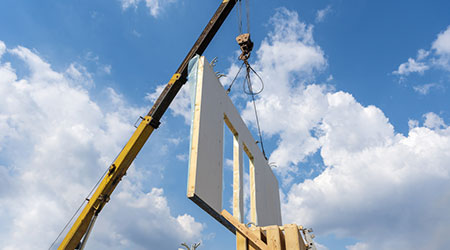Modular construction is a long-term trend for the healthcare industry. It has many benefits, but it still isn’t without its disadvantages.
Since the construction happens off-site, the modules of your new facility will need to be carefully rigged and transported directly to the job site. The transportation process requires delicate care, as one mishap in transit can result in significant repairs. Additionally, the operation requires more complex decision making for design, material selection and coordination much earlier in the process, effectively “front-loading” the project team’s involvement before the typical start of construction due to modularity’s quick turnaround.
Similar to manufacturing environments, once the process is underway revisions to design and materials will have a significant impact on the manufacturing schedule. With that, even though the overall cost is reduced, the initial fees early on are likely to be higher. Connect with your manufacturer early in the process to understand anticipated costs, timing and decisions.
As modular construction becomes more prevalent in the healthcare sector and you weigh the pros and cons, you may wonder: Why should our industry embrace this trend? To help determine if modular construction is right for your next healthcare facility project, evaluate three elements with your potential manufacturing partner:
Capability: Does the manufacturer of the final project have the capability to do what they say they can do? Look into the manufacturer’s recent achievements and if they’ve utilized pre-fabrication and/or modules in the past.
Capacity: Does the manufacturer have the capacity to produce your vision? Too often, a manufacturer’s capability and capacity do not match.
Maturity: What is the manufacturer’s maturity? Are there thousands of workers available with an existing distribution channel that can handle the volume coming their way? Are the required materials available or on-site? An ample supply chain and experience in the field is crucial.
Going from blueprints to ribbon cutting is an arduous process, but with modular construction, it doesn’t have to be. Building a multi-functional healthcare facility that will remain open 24 hours a day, seven days a week isn’t just a goal, it’s a necessity. Modular construction helps set the foundation for your next healthcare project by doing just the opposite – setting it off-site.
Mike Wood is the Vice President of Planning, Design, Construction & Energy at Medxcel, specializing in the creation, direction, organization and administration of Medxcel's national construction portfolio. Medxcel provides healthcare service support and drives in-house capabilities and efficiencies for healthcare organizations. Wood leads his construction management teams with his 35-plus years of leadership experience and his unique diverse strategic and operations knowledge in the healthcare sector.

 Healthcare Real Estate: Challenges and Industry Shifts for 2025
Healthcare Real Estate: Challenges and Industry Shifts for 2025 Geisinger to Build $32 Million Cancer Center in Pennsylvania
Geisinger to Build $32 Million Cancer Center in Pennsylvania Sunflower Medical Group Experiences Data Breach
Sunflower Medical Group Experiences Data Breach Strategies to Eradicate Biofilm Containing C. Auris
Strategies to Eradicate Biofilm Containing C. Auris Man Attacks Nurses, Police Officer at Jefferson Hospital
Man Attacks Nurses, Police Officer at Jefferson Hospital